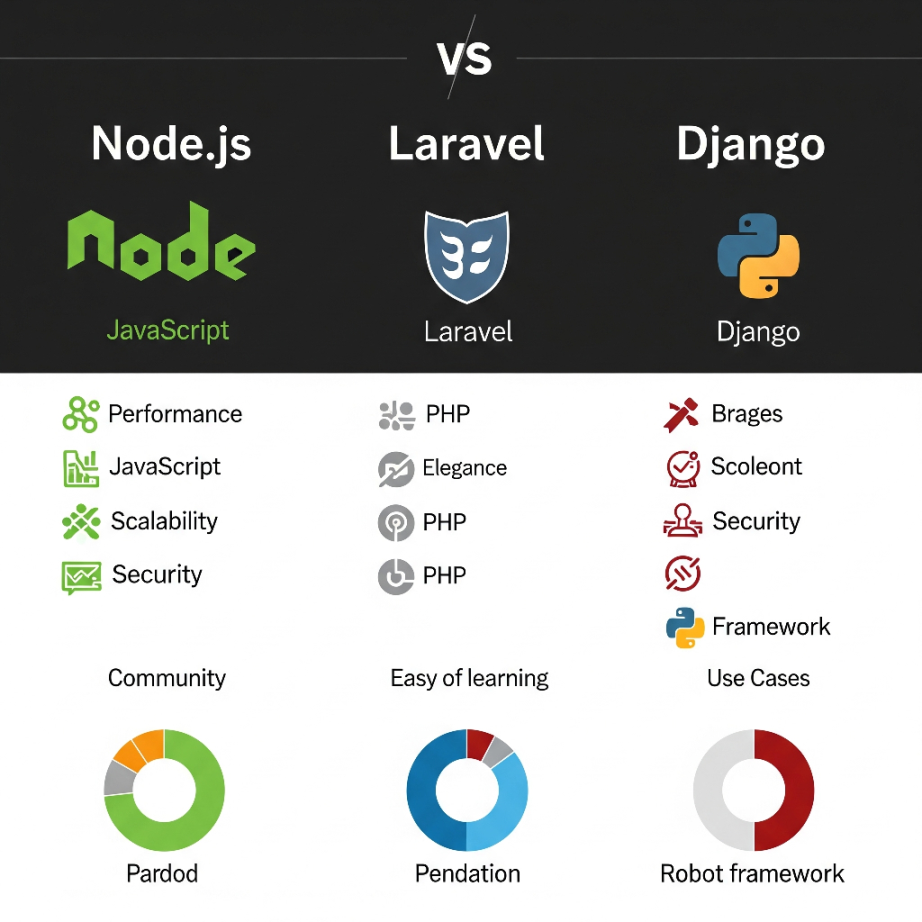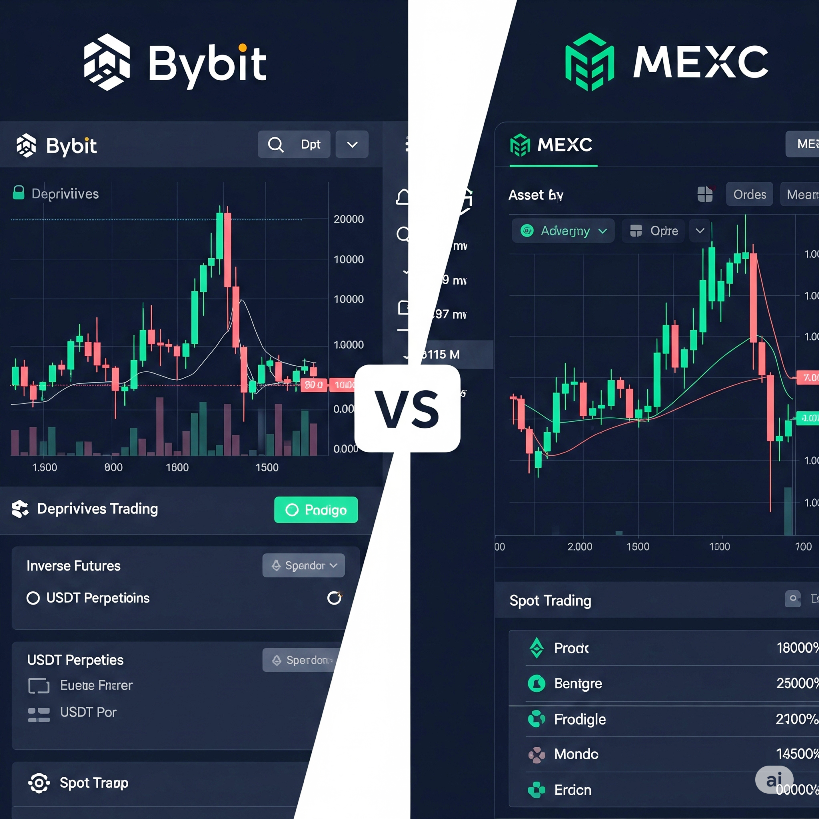So you're trying to pick a backend technology for your next project, and you've narrowed it down to the big three: Node.js, Laravel, and Django. Been there, done that. After spending years working with all three frameworks, I can tell you that each one has its own personality - kind of like choosing between a sports car, a luxury sedan, and a reliable SUV.
Let's dive deep into what makes each of these technologies tick, and more importantly, when you should (or shouldn't) use them. I'll share some real code examples and honest opinions based on actual project experience.
The Philosophy Behind Each Framework
Before we get our hands dirty with code, it's worth understanding what each framework is trying to achieve. Node.js isn't technically a framework - it's a runtime that lets you run JavaScript on the server. But when people say "Node.js development," they usually mean the entire ecosystem including Express, Koa, or Fastify.
Laravel is PHP's golden child - it's elegant, expressive, and tries to make common tasks feel effortless. Django, on the other hand, follows Python's "batteries included" philosophy. It gives you everything you need right out of the box, but sometimes that means dealing with stuff you don't actually want.


Performance: The Numbers Game
Everyone wants to know which one is faster, but honestly, it's a bit like asking whether a Ferrari is faster than a Tesla - it depends on what you're measuring and under what conditions. Node.js typically wins raw throughput benchmarks because of its non-blocking I/O model. But here's the thing: most applications aren't going to hit those theoretical limits anyway.
I've seen Laravel applications handle thousands of concurrent users without breaking a sweat, and Django powers some of the world's largest websites. The bottleneck is usually your database queries, not your framework choice. That said, if you're building something that needs to handle massive amounts of concurrent connections - like a chat application or real-time gaming server - Node.js has a clear advantage.
The best framework is the one your team can maintain effectively. A slightly slower application that's easy to debug and extend will always beat a blazing-fast codebase that nobody understands.
Personal Experience
Setting Up Your Development Environment
Let's get practical. Here's how you'd set up a basic API endpoint in each framework. I'll show you a simple user registration system to give you a taste of how each one handles common tasks.
Node.js with Express: The Minimalist Approach
const express = require('express');
const bcrypt = require('bcrypt');
const jwt = require('jsonwebtoken');
const { body, validationResult } = require('express-validator');
const app = express();
app.use(express.json());
// In-memory user store (use a real database in production!)
const users = [];
// Registration endpoint
app.post('/api/register', [
body('email').isEmail().normalizeEmail(),
body('password').isLength({ min: 6 }),
body('name').trim().isLength({ min: 2 })
], async (req, res) => {
const errors = validationResult(req);
if (!errors.isEmpty()) {
return res.status(400).json({ errors: errors.array() });
}
const { email, password, name } = req.body;
// Check if user already exists
const existingUser = users.find(u => u.email === email);
if (existingUser) {
return res.status(409).json({ message: 'User already exists' });
}
// Hash password
const saltRounds = 12;
const hashedPassword = await bcrypt.hash(password, saltRounds);
// Create user
const newUser = {
id: users.length + 1,
email,
password: hashedPassword,
name,
createdAt: new Date()
};
users.push(newUser);
// Generate JWT
const token = jwt.sign(
{ userId: newUser.id, email: newUser.email },
process.env.JWT_SECRET || 'your-secret-key',
{ expiresIn: '24h' }
);
res.status(201).json({
message: 'User created successfully',
user: { id: newUser.id, email: newUser.email, name: newUser.name },
token
});
});
app.listen(3000, () => {
console.log('Server running on port 3000');
});
Laravel: Eloquent Elegance
Laravel's approach is quite different. It gives you a lot more structure out of the box, which can feel overwhelming at first but becomes really powerful as your application grows.
// User Model (app/Models/User.php)
use Illuminate\Foundation\Auth\User as Authenticatable;
use Illuminate\Notifications\Notifiable;
use Laravel\Sanctum\HasApiTokens;
class User extends Authenticatable
{
use HasApiTokens, Notifiable;
protected $fillable = ['name', 'email', 'password'];
protected $hidden = ['password', 'remember_token'];
protected $casts = [
'email_verified_at' => 'datetime',
'password' => 'hashed',
];
}
// Controller (app/Http/Controllers/AuthController.php)
use App\Models\User;
use Illuminate\Http\Request;
use Illuminate\Support\Facades\Hash;
use Illuminate\Validation\Rules;
class AuthController extends Controller
{
public function register(Request $request)
{
$request->validate([
'name' => ['required', 'string', 'max:255'],
'email' => ['required', 'string', 'email', 'max:255', 'unique:users'],
'password' => ['required', 'confirmed', Rules\Password::defaults()],
]);
$user = User::create([
'name' => $request->name,
'email' => $request->email,
'password' => $request->password, // Automatically hashed by the model
]);
$token = $user->createToken('auth-token')->plainTextToken;
return response()->json([
'message' => 'User created successfully',
'user' => $user->only(['id', 'name', 'email', 'created_at']),
'token' => $token
], 201);
}
}
// Routes (routes/api.php)
use App\Http\Controllers\AuthController;
Route::post('/register', [AuthController::class, 'register']);
Django: The "Batteries Included" Philosophy
Django gives you the most structure upfront. Some developers love this, others find it restrictive. Here's how the same functionality looks in Django:
# models.py
from django.contrib.auth.models import AbstractUser
from django.db import models
class CustomUser(AbstractUser):
email = models.EmailField(unique=True)
created_at = models.DateTimeField(auto_now_add=True)
updated_at = models.DateTimeField(auto_now=True)
# serializers.py (using Django REST Framework)
from rest_framework import serializers
from django.contrib.auth.password_validation import validate_password
from .models import CustomUser
class UserRegistrationSerializer(serializers.ModelSerializer):
password = serializers.CharField(write_only=True, validators=[validate_password])
password_confirm = serializers.CharField(write_only=True)
class Meta:
model = CustomUser
fields = ('username', 'email', 'password', 'password_confirm', 'first_name', 'last_name')
def validate(self, attrs):
if attrs['password'] != attrs['password_confirm']:
raise serializers.ValidationError("Password fields didn't match.")
return attrs
def create(self, validated_data):
validated_data.pop('password_confirm', None)
user = CustomUser.objects.create_user(**validated_data)
return user
# views.py
from rest_framework import status
from rest_framework.decorators import api_view, permission_classes
from rest_framework.permissions import AllowAny
from rest_framework.response import Response
from rest_framework.authtoken.models import Token
from .serializers import UserRegistrationSerializer
@api_view(['POST'])
@permission_classes([AllowAny])
def register(request):
serializer = UserRegistrationSerializer(data=request.data)
if serializer.is_valid():
user = serializer.save()
token, created = Token.objects.get_or_create(user=user)
return Response({
'message': 'User created successfully',
'user': {
'id': user.id,
'username': user.username,
'email': user.email,
'first_name': user.first_name,
'last_name': user.last_name,
'created_at': user.created_at
},
'token': token.key
}, status=status.HTTP_201_CREATED)
return Response(serializer.errors, status=status.HTTP_400_BAD_REQUEST)
# urls.py
from django.urls import path
from . import views
urlpatterns = [
path('api/register/', views.register, name='register'),
]
Database Operations: Where the Magic Happens
This is where you'll really see the differences between these frameworks. Node.js gives you complete freedom - you can use any ORM or go raw SQL if you want. Laravel's Eloquent is genuinely beautiful to work with, especially for complex relationships. Django's ORM is powerful but can feel a bit verbose sometimes.
- Node.js: Maximum flexibility, but you need to make more decisions upfront
- Laravel: Eloquent ORM strikes a great balance between power and simplicity
- Django: Comprehensive ORM with excellent migration system, though sometimes overly complex
- All three handle basic CRUD operations well, but differ in advanced querying capabilities
- Laravel's query builder is probably the most intuitive for complex joins and aggregations
Real-World Considerations: Beyond the Code
Here's what I wish someone had told me when I was starting out: the framework you choose affects way more than just how you write code. It influences your deployment strategy, your team structure, even your hiring decisions.
Node.js projects tend to have more variety in their structure - which can be liberating or overwhelming depending on your team's experience. Laravel projects follow more predictable patterns, making it easier for new team members to jump in. Django projects are often the most "enterprise-ready" out of the box, with built-in admin panels and user management.
The ecosystem matters too. Node.js has npm, which is both a blessing and a curse - millions of packages available, but quality varies wildly. Laravel's Packagist is more curated, and Django's package ecosystem is smaller but generally well-maintained.
I've seen teams spend weeks debating framework choice, then months dealing with architectural decisions that could have been avoided by picking the right tool for their specific use case from the start.
Development Team Lead
Performance Gotchas and Optimization
Every framework has its performance pitfalls. In Node.js, blocking the event loop is the kiss of death - I've seen single CPU-intensive operations bring entire applications to their knees. Laravel can be sluggish if you're not careful with Eloquent queries, especially the N+1 problem. Django can struggle with complex admin interfaces if you don't optimize your querysets properly.
But here's the thing - most performance issues aren't framework-related. They're usually about database queries, caching strategy, or architectural decisions. I've optimized more applications by adding Redis than by switching frameworks.
Testing: How Each Framework Handles Quality Assurance
Testing approaches vary significantly between these frameworks. Node.js gives you complete freedom to choose your testing stack - Jest, Mocha, Jasmine, whatever floats your boat. This flexibility is great until you're staring at a blank test file wondering how to structure your test suite.
Laravel comes with PHPUnit integration and some really nice testing helpers. The ability to use database transactions for test isolation is fantastic, and Laravel's HTTP testing features make API testing almost enjoyable. Django's testing framework is comprehensive but can feel a bit heavy for simple unit tests.
// Laravel API testing example
public function test_user_registration_with_valid_data()
{
$userData = [
'name' => 'John Doe',
'email' => 'john@example.com',
'password' => 'securepassword123',
'password_confirmation' => 'securepassword123'
];
$response = $this->postJson('/api/register', $userData);
$response->assertStatus(201)
->assertJsonStructure([
'message',
'user' => ['id', 'name', 'email'],
'token'
]);
$this->assertDatabaseHas('users', [
'email' => 'john@example.com',
'name' => 'John Doe'
]);
}
Deployment and DevOps Considerations
This is where things get interesting. Node.js applications are generally the easiest to containerize and deploy, especially with tools like PM2 for process management. Laravel applications need a bit more setup - you'll need PHP, a web server, and possibly Redis or Memcached for optimal performance. Django applications are somewhere in between, but the WSGI/ASGI setup can be tricky for newcomers.
Cloud deployment varies too. All three work fine on major platforms, but Node.js tends to have the best support for serverless architectures. Laravel works great on traditional hosting, and there are specialized Laravel hosting services like Forge and Vapor. Django applications often end up on more traditional VPS or cloud instances.
The Community Factor: Support and Resources
The community around each framework has its own character. The Node.js community is massive and moves fast - sometimes too fast. New packages appear daily, but they can disappear just as quickly. The Laravel community is enthusiastic and well-organized, with excellent documentation and learning resources. Django's community is more academic and stability-focused, which shows in the quality of third-party packages.
Learning resources are abundant for all three, but they target different audiences. Node.js resources often assume JavaScript knowledge but vary widely in quality. Laravel has some of the best tutorial content I've seen, thanks partly to Jeffrey Way's Laracasts. Django's documentation is comprehensive but can feel intimidating to beginners.
Making Your Decision: A Framework for Choosing Frameworks
So how do you actually choose? Here's my decision framework based on real project experience:
Choose Node.js if you're building something that needs real-time features, your team is JavaScript-heavy, or you need maximum flexibility in your architecture. It's also great for microservices and serverless applications.
Choose Laravel if you want rapid development with elegant syntax, you're comfortable with PHP, and you need a good balance of structure and flexibility. Laravel shines for traditional web applications and APIs.
Choose Django if you're building content-heavy applications, you need a robust admin interface, or you're working in a Python-centric environment. Django is excellent for content management systems and data-driven applications.
Remember, there's no universally "best" choice. The best framework is the one that matches your team's skills, your project's requirements, and your long-term maintenance capabilities. I've seen successful projects built with all three frameworks, and I've seen projects fail despite using the "right" technology.
The most important thing is to pick one and get building. You can always refactor later, but you can't refactor code that doesn't exist yet. And honestly, the differences between these frameworks matter less than having a well-designed architecture and clean, maintainable code.














0 Comment